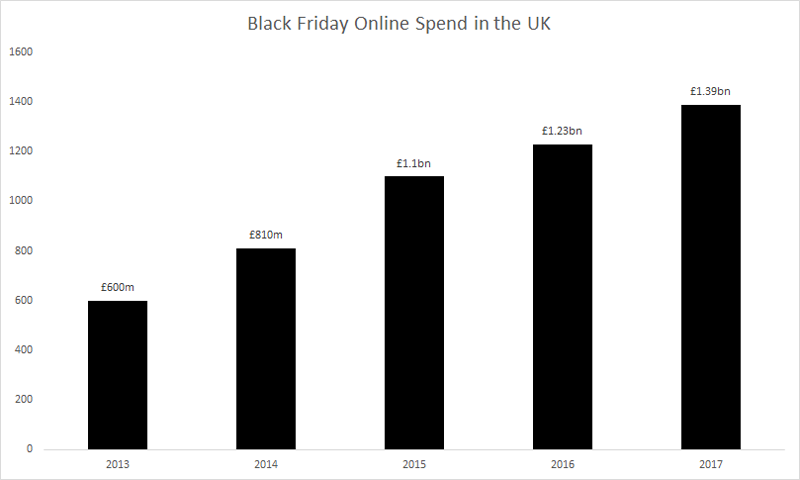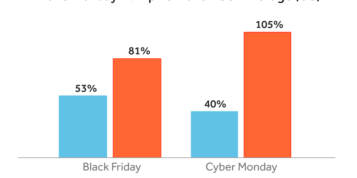The day after Thanksgiving in the US is commonly referred to as Black Friday, and it’s the biggest day of the year for retailers as the Christmas shopping season kicks off. We’ve all seen the photos of mobs of shoppers clamouring to get their hands on TVs and other electronics at unbelievable prices, but the day has evolved quite a bit thanks to the rise in online shopping.
The History of Black Friday
There are lots of myths surrounding the origin of “Black Friday”, but the term was actually first coined by Philadelphia police officers in the late 1950s to describe the overcrowding and general pandemonium that came along with people skipping work the day after Thanksgiving. Because Thanksgiving always falls on a Thursday, many people find it difficult to resist the temptation to stay home from work the next day and turn it into a long weekend.
In Philadelphia, the streets would be jammed with traffic and people heading out from the suburbs to snag pre-Christmas bargains, along with many others who were going to the yearly Army-versus-Navy football match held there. The city promoted huge sales and holiday decorations to take advantage of the influx of people, but police would use the phrase “Black Friday” when discussing the phenomenon with the media in hopes of discouraging shoppers and others from contributing to the crowds. It’s hard to blame them; they were stuck working extended shifts and their bosses wouldn’t allow them to take the day off. Retailers tried to give this unflattering term a more attractive spin by calling it “Big Friday”, but the name never really caught on.
Eventually, the phrase “Black Friday” gained popularity around the country as businesses caught on to the fact they could draw in huge volumes of shoppers by offering one-day-only sales on this particular date. The event has now grown into the biggest sales event of the year and is considered the beginning of the official Christmas shopping season.
Even though many people are now taking advantage of online sales on this day, shoppers continue to flock to brick-and-mortar shops – sometimes waiting in line for hours or even overnight – to take advantage of the best bargains.
Experts say there is no credibility to the explanation that it’s the day of the year that retailers traditionally first went from being “in the red” on their balance sheets to becoming profitable and “in the black”, nor is there any truth behind the myth that it was a day that slave traders offered discounts at auctions.
The Biggest Sales Event of the Year
Black Friday shows no signs of slowing down despite the changing retail landscape. On Black Friday 2017, shoppers spent $5.03 billion online and $7.9 billion overall, according to Adobe Digital Insights, making it yet another record-breaking day for online shopping. This was 16.9 percent higher than the $3.34 billion in online sales noted the year before. Compare that to 2016’s $1.656 billion in sales and you’ll see just how sharply online Black Friday sales are growing; they only started breaking the $1 billion mark in 2012.
The average value of online Black Friday orders in 2017 was $135, a rise of 0.9 percent over 2016. Sales made on smartphones were responsible for 26 percent of that revenue as mobile shopping continues to take a bigger share of the online shopping market. More than 77 million shoppers hit physical stores on Black Friday, while 66 million people shopped online.
What are people buying on Black Friday? Electronics are among the most popular products that people buy, with TVs, video games and consoles, computers and smartphones often being offered at steep discounts. Clothing and footwear is another popular category, and toys always perform well on Black Friday. Although it’s not as popular of a category as electronics or fashion, cookware and kitchen gadgets have a strong presence, especially small appliances.
Black Friday Online Spend in the UK

Source: Experian and IMRG
Black Friday online spend in the UK has been rapidly growing over the past few years, more than double what it was in 2013. In 2017 the estimate online spend reached a staggering £1.39bn according to IMRG.
Black Friday vs. Cyber Monday
While Black Friday can be traced back to the 1950s, Cyber Monday is a relative newcomer on the scene, debuting in 2005. Online shopping was just starting to gain a more widespread level of acceptance back then, and online retailers noticed a spike in sales on the Monday after Thanksgiving and Black Friday. That’s because many people still had dial-up modems at home and would wait until they returned to work after the holidays to place orders using the high-speed internet and fast computers in their offices.
Online retailers embraced this trend, and the National Retail Federation gave the day the name Cyber Monday. Many sites offer sales on this day that beat the discounts offered online on Black Friday. Now that lots of shoppers have not only high-speed internet at home but also mobile devices within reach around the clock, it has really taken off. Nine out of ten retailers now offer sales on Cyber Monday.
Although online sales continue to grow on Black Friday, Cyber Monday sales eclipse them, with Adobe Insights reporting that online transactions on 2017’s Cyber Monday hit a record $6.59 billion. This was a rise of 16.8 percent over 2016, and it also marked the first time that mobile sales alone hit $2 billion in a 24-hour period.
When is Black Friday 2018?
Black Friday 2018 falls on Friday, November 23, although it is worth noting that there will also be great deals offered on Thanksgiving Day – Thursday, November 22 – as well as Cyber Monday, which will fall on November 26, 2018. Those looking for a bargain should start checking for sales online in the run-up to the big day as many retailers announce their sales ahead of time to help shoppers make their plans.
Given the massive success of online shopping on Black Friday in 2017, don’t be surprised to see retailers respond in kind by offering even better online deals on Black Friday 2018 for those shoppers who would rather avoid the crowds and make their purchases from the comfort of their own homes.





